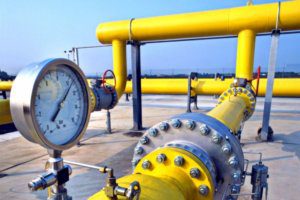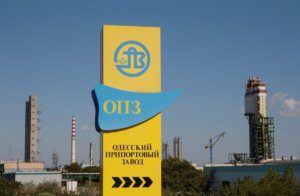
The volume of completed construction works in Ukraine in August 2018 decreased by 1.1% compared to August 2017, whereas growth in July 2018 from July 2017 was 9.7%. The report does not include data from temporarily occupied territories, namely the Autonomous Republic of Crimea and partly Donetsk and Luhansk regions, the State Statistics Service of Ukraine has said. The volume of completed construction works in August 2018 from July 2018 decreased by 6.4% (according to seasonally adjusted data, it decreased by 6.9%), whereas there was a 5.8% fall in July 2018 from June 2018.
Residential and nonresidential construction declined in August 2018 from August 2017, while the construction of engineering facilities was on the rise. According to unadjusted data, residential construction saw a 13.3% decline, while the decline of nonresidential construction was 5.4%. The construction of engineering facilities increased 6.4%.
The construction of residential buildings in August 2018 from July 2018 decreased by 9.9%, the construction of nonresidential buildings grew by 5.5%, engineering facilities fell by 10%.
In January-August 2018, a decrease in construction work compared to the same period of 2017 was recorded in 11 regions of Ukraine and Kyiv city, including in Luhansk (by 43.7%, to UAH 233.2 million), Sumy (by 20.9%, to UAH 635.7 million) and Zakarpattia (by 17.8%, to UAH 710.5 million) regions.
The highest increase in completed construction works in the eight months ending August 2018 was recorded in Odesa (by 43.7%, to UAH 9.597 billion) Khmelnytsky (by 32.5%, to UAH 1.663 billion) and Ivano-Frankivsk (by 31.4%, to UAH 1.7 billion) regions.
In Kyiv, the volume of construction work in the eight months ending August 2018 fell by 3.7%, to UAH 16.741 billion.

Ukraine has raised natural gas reserves in its underground storage facilities (UGS) by 8.374 billion cubic meters (bcm) after the end of the heating season, JSC Ukrtransgaz has said.
Thus, from April 8 to September 22, gas reserves in storage facilities more than doubled, to 15.81 bcm from 7.435 bcm
According to Interfax-Ukraine’s estimates, gas stocks on September 1 through September 22 increased by 1.17 bcm (53.19 million cubic meters [mcm] a day), in August by 1.793 bcm (57.85 mcm per day), in July they expanded by 1.655 bcm (53.38 mcm a day), in June by 1.622 bcm (54.09 mcm per day), in May by 1.632 bcm (52.65 mcm per day), on April 9 through April 30 by 500.84 mcm (22.77 mcm per day).
Ukraine had the smallest gas inventories after the 2017/18 heating season compared with the previous three seasons. Frosts in March and early April were recorded.
The Cabinet of Ministers of Ukraine expects that gas stocks as of November 1, 2018, would reach 17 bcm.
Ukrtransgaz, wholly owned by NJSC Naftogaz Ukrainy, operates the system of trunk gas pipelines and 12 underground gas storage facilities of the country with a total capacity of 31 bcm.

Several companies and banks are designing a mobile application for buying government domestic loan bonds, Head of the Depositary Operations Department of the National Bank of Ukraine (NBU) Andriy Suprun has said.
“I think that next year, perhaps at the beginning of the year, the purchase of government domestic loan bonds by individuals can occur in several clicks in a mobile application. Several market players are currently working on the creation of this solution,” he said at the annual Ukrainian Financial Forum in Odesa, organized by the ICU investment group.
Suprun said that the NBU, for its part, provides them with the necessary support.
“We are writing an open API [application programming interface] and allow everyone to get involved in this competition, to provide the corresponding service to the market,” he said.
In addition, the representative of the NBU said there will be an opportunity to submit brokerage applications in the primary government domestic loan bonds market in the near term.
“In fact, the next auction can take place with a possibility for any investor to submit applications to the Finance Ministry through primary dealers. This should improve the indicators of attracting funds, primarily from the population,” Suprun said.
In general, he considers these initiatives to be mutually beneficial for the state and the population.
“The state receives a resource, natural persons – a good percentage, almost tax free, in contrast to deposits, as well as a 100% state guarantee for any amount,” he said.

Odesa Port-Side Plant in October would announce a new tender to select a supplier of natural gas for processing on tolling terms, acting Head of the State Property Fund (SPF) of Ukraine Vitaliy Trubarov has said.
“As are as I understand, the tender will be announced again next month and maybe there are economic entities, possibly foreign ones, that could supply their own gas, and the enterprise could operate,” he told journalists in Odesa on the sidelines of the Ukrainian Financial Forum organized by the ICU investment group.
The head of the SPF said that the final decision on the tender is taken by the company management, since representatives of the SPF are members of the supervisory board and do not have the right to interfere in the economic activities of the enterprise.
Trubarov said that in the current market conditions, the attraction of the supplier of gas on tolling terms is the only opportunity of operating for Odesa Port-Side Plant, since “gas that occupies more than 90% of the production cost is quite expensive, and the prices for end products are subsiding.”
According to him, the conditions of the tender to select the company are absolutely open, and the difficulty to select it is the absence of a large number of interested companies.
He said that the SPF is extremely interested that the plant is operating at the time of the privatization work.
“Our task in this matter is to build the work in a way that at the time of sale this asset was operating, alone or with the help of a supplier of natural gas for processing on tolling terms, but operating. Selling an idle enterprise, in my opinion, is a double problem,” the SPF head said, recalling the even more complex problem of toxic debts of the Odesa Port-Side Plant to the structure of Dmytro Firtash.